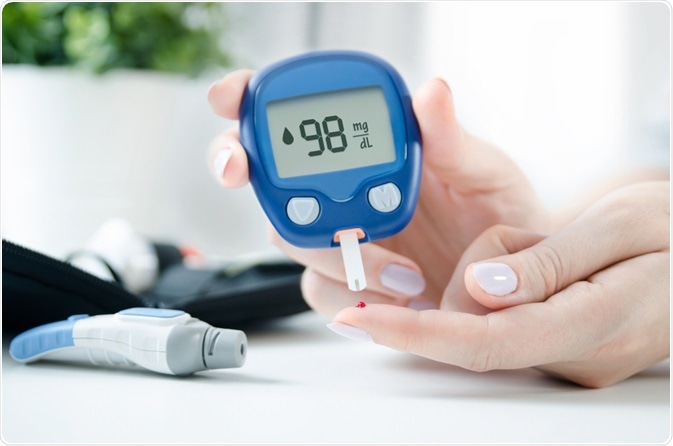A variety of stimulations and mechanisms tightly regulates blood sugar levels. This is important for metabolic homeostasis. Levels may fluctuate after fasting for long periods of time or an hour or two after food consumption. Despite this, the fluctuations are minor. Normal human blood glucose levels remain within a remarkably narrow range.
 Image Credit: Proxima Studio / Shutterstock.com
Image Credit: Proxima Studio / Shutterstock.com
Blood sugar fluctuations
In most humans, this varies from about 82 mg/dl to 110 mg/dl (4.4 to 6.1 mmol/l). The blood sugar levels rise to nearly 140 mg/dl (7.8 mmol/l) or a bit more in normal humans after a full meal. In humans, normal blood glucose levels are around 90 mg/dl, equivalent to 5mM (mmol/l).
Since the molecular weight of glucose, C6H12O6, is about 180 g/mol, when calculated, the total amount of glucose normally in circulating human blood is around 3.3 to 7g (assuming an ordinary adult blood volume of 5 liters).
In other words, in a healthy adult male of 75 kg (165 lb) with a blood volume of 5 liters (1.3 gal), a blood glucose level of 100 mg/dl or 5.5 mmol/l means a total of about 5 g (0.2 oz or 0.002 gal, 1/500 of the total) of glucose in the blood.
This also means approximately 45 g (1½ ounces) in the total body water. Total body water includes more than mere blood and will usually be about 60% of the total body weight in men. 5 grams of glucose are equivalent to a small sugar packet or a teaspoon full of sugar.
To be considered a non-diabetic, the American Diabetes Association recommends a post-meal glucose level less than 180 mg/dl (10 mmol/l) and a pre-meal blood glucose level of 90-130 mg/dl (5 to 7.2 mmol/l).
Molarity and mass concentration
Blood glucose is measured in terms of molarity, measured in mmol/L or millimoles per liter. In the United States, and to a lesser extent elsewhere, mass concentration, measured in mg/dL. If an mg/dL figure is converted to mmol/L, it is to be divided by 18 or multiply by 0.055. Similarly, to convert a mmol/L figure to mg/dL it is multiplied by 18 or divided by 0.055.
References
Further Reading
Last Updated: Jun 14, 2023